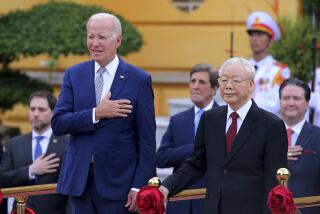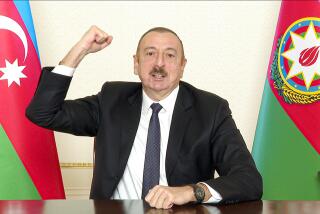U.S. Urged to Qualify Aid to Cambodian Rebel Factions
- Share via
Unless Prince Norodom Sihanouk of Cambodia severs ties with the Khmer Rouge, the United States should not send arms or humanitarian aid to non-Communist rebel factions affiliated with him, Rep. Chester G. Atkins (D-Mass.) said here Saturday.
Speaking at an international symposium on U.S.-Indochina relations, the congressman questioned the Bush Administration’s position that although it abhors the “genocidal violence” of the Khmer Rouge, the United States would be willing to support a settlement in which the radical Communist faction would be part of a future coalition government in Cambodia.
The Khmer Rouge is blamed for the deaths of more than 1 million people during its 3 1/2-year rule in Cambodia from 1975 to early 1979.
End of Curbs Urged
At Saturday’s session capping the two-day symposium, Asian specialist Jerome A. Cohen urged the Bush Administration to end its trade embargo against Vietnam, a proposal that drew mixed reviews from the audience.
Atkins criticized U.S. policies in response to comments that if the Khmer Rouge was excluded from power-sharing, it would try to gain power through military means.
“The United States has kind of an absurd position,” Atkins said. “We have to give the Khmer Rouge legitimacy in order to ensure that they never return to power.”
At a 19-nation conference in Paris last month, participants failed to achieve a Cambodian settlement partly because of disagreement on the role of the Khmer Rouge. Sihanouk insisted that the Khmer Rouge be part of a four-party interim coalition government, along with Sihanouk’s faction, another non-Communist resistance group and the current Communist regime in Cambodia.
Atkins said that to receive U.S. aid, Sihanouk must stop insisting on a role for the Khmer Rouge, but he added, “I feel we have an obligation to give Prince Sihanouk the opportunity to disassociate himself from the Khmer Rouge.”
Speakers at the symposium, sponsored by the Asia Society, The Times and Times Mirror Co., debated whether Washington should normalize relations with Hanoi.
Cohen, an attorney, told the audience of about 200 scholars and diplomats that as a first step toward normalization, the United States should end its trade embargo against Vietnam. He said having a business presence in Vietnam would help Americans understand the country and be an opportunity to influence developments there.
“Why should we deny ourselves the opportunity?” Cohen asked. Ending the embargo would also be a way of rewarding Vietnam for its promised withdrawal of troops from Cambodia by Sept. 26, he said.
But Than Pok, executive director of United Cambodian Community Inc. in Long Beach, challenged Cohen. “We seem to have very short memories of what happened,” he said. “You rush into trade with them. Why don’t you satisfy the conditions you had set before?”
Nguyen Manh Hung, director of the Indochina Institute at George Mason University, said a majority of Vietnamese in the United States oppose normalization because it would be equivalent to “conferring legitimacy to a discredited regime.”
More to Read
Sign up for Essential California
The most important California stories and recommendations in your inbox every morning.
You may occasionally receive promotional content from the Los Angeles Times.













